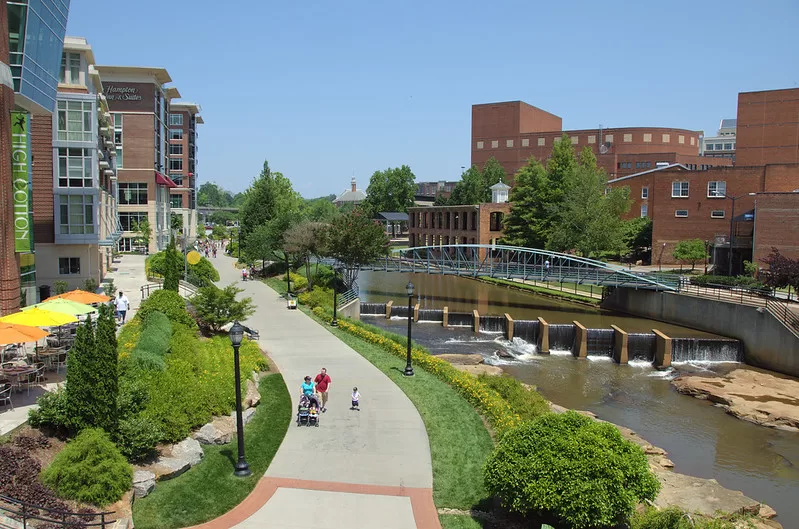The real estate landscape in Greenville, South Carolina, is a dynamic and ever-evolving one. Homebuyers, sellers, and real estate professionals must navigate a host of challenges and opportunities in this vibrant market.

From persistent inventory shortages to the impact of rising interest rates, the Greenville real estate industry faces a unique set of circumstances. In this blog post, we’ll explore these challenges and offer practical solutions from a real estate industry perspective.
One of the foremost challenges in Greenville’s real estate market is the consistent shortage of available properties. This scarcity has driven up home prices, making it increasingly difficult for prospective buyers to find affordable housing. From single-family homes to condos, the inventory shortage touches every corner of the market.
One viable solution is to encourage new construction projects. Collaborating with builders and developers to construct more homes can help alleviate the inventory shortage over time. Local government incentives and streamlined permitting processes can facilitate this effort.
Investing in affordable housing initiatives can also help address this issue. Public-private partnerships can be formed to create affordable housing options for individuals and families with limited means.
Another significant challenge is the impact of rising interest rates on the real estate market. As interest rates increase, the cost of borrowing money to purchase a home also rises, potentially discouraging potential buyers and slowing down the market.
Real estate professionals can play a vital role in educating potential buyers about the implications of rising interest rates. Offering workshops or online resources that explain how interest rates work and their long-term effects can empower buyers to make informed decisions.
Encouraging lenders to diversify loan options can also mitigate the impact of rising interest rates. Offering fixed-rate mortgages, adjustable-rate mortgages, and other financing choices can provide flexibility for buyers in different financial situations.
Read Also:
In an increasingly digital world, the real estate industry in Greenville faces the challenge of adapting to technological advancements. Buyers and sellers are seeking seamless online experiences, and real estate professionals must keep pace.
To address this challenge, real estate agents can invest in virtual tour technology and 3D imaging to provide immersive property views. These tools enable buyers to explore homes from the comfort of their own screens, enhancing their decision-making process.
Leveraging digital marketing strategies, such as social media advertising and targeted online campaigns, can help real estate professionals reach a broader audience and stay competitive in a rapidly evolving market.
Navigating the complex web of regulations and policies is another challenge that the Greenville real estate industry faces. These regulations can impact everything from zoning and land use to property taxes and financing.
Real estate industry professionals can work together to advocate for streamlined and consistent regulations. Engaging with local government officials and participating in community planning initiatives can help shape policies that are favorable to the industry.
Staying informed about regulatory changes and requirements is crucial. Real estate agents and professionals should invest in ongoing education to ensure they are up-to-date with the latest regulations and can guide their clients accordingly.
As environmental consciousness grows, real estate in Greenville faces challenges related to sustainability and climate change. Buyers are increasingly interested in eco-friendly and energy-efficient homes.
Encouraging the adoption of green building practices can be a win-win for the real estate industry and the environment. This includes promoting energy-efficient appliances, sustainable materials, and eco-friendly construction methods.
Real estate professionals can make energy efficiency a selling point. Listings that emphasize features like solar panels, insulation, and efficient heating and cooling systems can attract environmentally conscious buyers.
Amidst these challenges and solutions, the importance of real estate professionals cannot be overstated. Buyers and sellers rely on the expertise of agents, brokers, and industry specialists to navigate the complex world of real estate.
In an era of readily available information, professionals provide invaluable insights, negotiation skills, and local knowledge that can make all the difference.
As the industry evolves, investing in ongoing education and professional development becomes essential for real estate experts to continue offering top-notch service to their clients.
By valuing the contributions of real estate professionals, the Greenville market can ensure that both buyers and sellers receive the guidance they need to navigate these challenges successfully.
Addressing the challenges in Greenville’s real estate market necessitates a collaborative approach within the community. Realtors, developers, local government officials, and residents must come together to find sustainable solutions.
Community forums and town hall meetings can serve as platforms for open dialogue, enabling stakeholders to share ideas, concerns, and proposals for improvement. This collective effort can lead to the development of innovative strategies and policies that benefit everyone involved.
In an ever-changing world, adaptability is key. The real estate industry in Greenville, as elsewhere, must remain agile and forward-thinking.
Keeping an eye on market trends, economic shifts, and technological advancements is essential. Professionals should also anticipate potential challenges and proactively work towards solutions.
By embracing change and staying committed to the principles of transparency, integrity, and professionalism, the Greenville real estate market can not only overcome present challenges but also thrive in the face of future uncertainties.
With determination and a collaborative spirit, Greenville’s real estate industry can continue to be a cornerstone of the community and a source of opportunity for all.
In conclusion, the challenges facing Greenville’s real estate market are multifaceted, but they are not insurmountable. By implementing innovative solutions and adapting to changing circumstances, the industry can continue to thrive.
From addressing inventory shortages to navigating rising interest rates, embracing technology, and advocating for sensible regulations, the Greenville real estate community has the tools to overcome these challenges and build a stronger, more resilient market for the future.